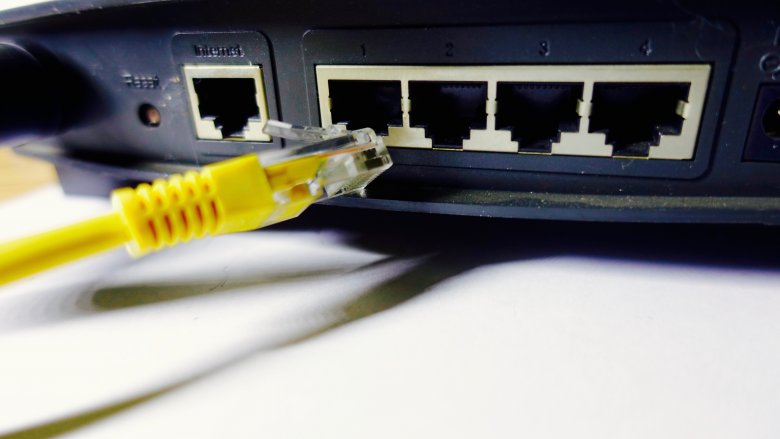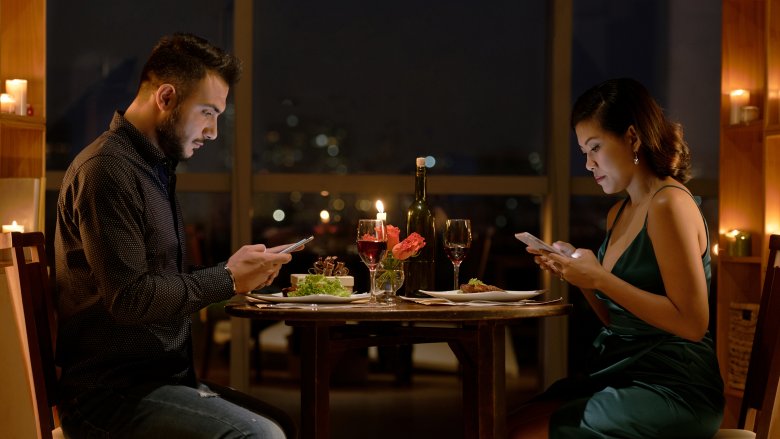Things That Were Better Before The Internet Came Along
The internet is amazing. It has given us access to nearly all the information in the world, right at our fingertips. It allows us to work from home, stream shows for hours, and show off everything from our food to our wedding. It has become a vital part of our lives, with some people getting genuinely panicky if they lose access for any length of time. And now with smart phones, that hardly ever has to happen. You can't escape the internet.
And that might be a bad thing. Because all the amazing things the internet gives us also have a dark side to them. After reading this, you might pine for the simpler days before you were connected all the time.
Pets
There was a time when pets were just your best friend and companion and nothing more. They gave you love unconditionally, and it didn't matter if they weren't the most photogenic thing ever because you knew they were cute in real life. These days, with every part of our lives being shared online, that doesn't cut it anymore. Pets have to be ready to turn into internet celebrities at any moment.
Quartz points out that while there have always been famous animals like Lassie and Spuds MacKenzie, the internet has taken them to a new level. All it takes is a creative owner and super cute looks and any pet is ready for online fame. If the pictures you post of you pet are good enough, soon you might start getting a small following. That might lead to things like endorsements, guest appearances, and lots of freebies.
From there the very cute get even bigger followings and the stuff that comes with great fame. Jiff the Pomeranian has more than one manager, something not even most actors have. When Toast the King Charles Spaniel got "married" in 2016, she wore a designer gown and $139,000 necklace. Once they have about 100,000 followers, animals can expect to pull in $2,000 per appearance. Just think what the ones who have millions of followers are making. What happened to just sitting at home on the couch and asking for belly rubs, or sitting on the keyboard while your human tries to write?
Being a real fan
In the old days you had to work to be a fan of something. If your favorite TV show or movie was a little esoteric, you might be the only person you knew who liked it. If you wanted to geek out about it, you'd have to try and get your friends into it. Maybe you'd join the fan club of an actor, which not only cost money but meant you would receive information about them through the mail. Remember mail? People used to look forward to getting it. In the back of the fanzine you might find an address where you could write to your idol and dream they answered it and not an army of assistants.
These days you can find a place dedicated to virtually anything you love on the internet. The Walrus points out that there are thousands of fan sites and chat rooms, where you can find out you aren't the only person who's written slash fiction about Alvin and the Chipmunks. Nowhere near the only person. If you're obsessed with a performer, chances are you can find them on Twitter, where you can tweet right at them.
Maybe that's why today there are so many arguments about people being "real fans" of something. It's too easy for the casual liker to have access to the same information as true obsessives. Everyone can start a fan Tumblr. The line has been blurred.
The mystery of a first date
Before the internet, first dates had a mystique to them. You met someone cute in real life (more on that later) or maybe were being set up by a mutual friend. You had a few hours to get to know as much about them as you could and decide if you could see the relationship going somewhere. It was important to get all the superficial but important stuff out of the way, like how many siblings you had, what your job was, your political opinions, etc.
These days you don't have to worry about finding any of that stuff out because you will have learned it all online beforehand. Social media has given us access to so much information about potential dates that it's almost pointless to go on that first date. A writer for Fortune even talked to a guy who asked a girl out, then looked her up online and learned so much about her that he actually canceled. Not because what he found out was bad, just because he couldn't think about what they would possibly talk about since he already was able to find out all the little things.
This doesn't even touch on how online dating makes people spoiled for choice. These days you don't have to settle for someone who might be perfect for you otherwise but has even one tiny thing you don't like because you can always swipe again. Dating profiles, like social media, take the mystery out of dating.
Suspense in TV shows
Remember the good old days before Netflix? You had to wait a whole week to see the next episode of your favorite shows, and then they threw a major cliffhanger at you and you had to wait the entire summer to find out what happened. It was a simpler time. Not so anymore thanks to Hulu and Netflix. Now you can binge to your heart's content. But is it better?
Science says no. According to the Independent, a study from the journal First Monday found that you're probably enjoying those binged shows less. It comes down to your memory. You just forget more of what happened when you watch a bunch at a time, as opposed to waiting in between episodes.
Then there's all the cheating it leads to. If you watch shows with your significant other, there's a good chance you've skipped ahead and watched available episodes without them sometimes. This is known as Netflix cheating, and it is rampant. CNN relayed a study Netflix did in 2017 and found 48 percent of Americans had "cheated" on their partner in this way.
Even if you do still watch shows on regular TV, and of course, go see new, popular movies, the internet is here to spoil them for you before you get the chance. Gizmodo notes that even if you avoid the obvious places for spoilers, some jerk on your Facebook newsfeed is just as likely to ruin it for you. Darn it, internet.
Work/life balance
Before the internet, it was simple to go home and put your work behind you. To bring your work home with you, you had to bring actual stuff home, like files or contracts. The only way your boss could reach you would be to call, probably to a landline, and you could always say you had been out or in the shower or something. Going on vacation was simple, since no one could get to you. It was much easier to have a good work/life balance than it is today, when your work is literally in your pocket.
As far back as 2011, people were worrying about what this meant. A New York Times article from that year talked to a woman who used her cell phone to do work while she was in the hospital in labor. (Let that sink in for a moment.) New Zealand's Stuff calls this bleeding of work into your private time "smartphone creep." They predicted that it would take court cases to determine just how many out-of-work hours an employer could demand of you before it became illegal.
In 2015, the company Workfront released a poll of 600 workers that found 56 percent of them thought smartphones were killing family dinners, since employers know they can get a hold of you at any time and expect prompt responses. Forty percent thought it was okay to respond while eating with their loved ones. This has to stop.
Being sick
Getting ill has never been an awesome thing to look forward to, but at least it was pretty straightforward. You dragged yourself to the store to buy medicine, and if it got really bad you went to the doctor and they told you what you had. Then you lay in bed for a few days hating life. Simple.
But as CNN points out, one group of people always thought they had every terrible disease under the Sun: medical students. Since they were bombarded with information about tumors and skin cancer and everything else, they would convince themselves they had whatever it was. Now, thanks to the internet, we're all in that same boat.
Thinking you have some terrible disease because you read about it on the internet even has a fancy name: cyberchondria. When you start feeling poorly, you look up your symptoms online and within a few minutes have convinced yourself you are dying. According to Psychology Today, about 90 percent of Americans do "online symptom checking." That's a lot of people who have access to information they never would have had before the internet. They would have taken their headache in stride, never imagining a brain tumor was causing it. Fortunately, the Independent says only about 5 percent of people truly believe something horrible is happening to them, but that might be a contributor to the one-third of people who go to the doctor only to find out they have nothing wrong with them.
Getting engaged (and other life milestones)
If you've used Facebook, you know that half your newsfeed is just people showing off special life milestones. Whether that's engagements, weddings, first cars, or new babies, it's almost like if you don't share it with the world it didn't happen. If social media adds pressure to how you eat food so it can be gawked at by hundreds of people, that's nothing compared to how the most important moments of your life have to be absolutely perfect now.
According to the Telegraph, so many men are worried about getting their proposal wrong that half of them no longer pick out a ring beforehand, in case it isn't the perfect one their intended wants to show off to everyone she knows. The Washington Post says there are actual businesses now that (for thousands of dollars) will help men plan huge, elaborate proposals that can be easily shared on social media or YouTube.
Before the internet it was so much simpler and more intimate. Proposals were personal, just between the two of you (or maybe a stadium full of people if your husband-to-be went the Jumbotron route). You could look forward to telling the story to everyone who asked because there was no way they would know otherwise. Baby pictures could be done on a cheap camera and stuck in a special book. These days there's too much pressure to have these over-the-top perfect moments to show off.
Pub quizzes/trivia nights
Quiz nights at your local bar are a great way to show off how smart you are to your friends. You can down a few cold ones while using all the information from high school history class that your teacher swore you'd need to know one day. She just didn't say you'd be drunk when that time came. It's a fun night for all involved, from making up a punny team name to taking home those free T-shirts for winning at the end of the night.
Of course, the internet is here to ruin all the fun for us. In 2013, the Telegraph reported that while the popularity of pub quizzes was soaring in the U.K., with eight of 10 people saying they had attended one, cheating had also become rampant. The temptation can be too great. When you have access to all the answers right in your pocket, some people are going to give in and use their smartphone to cheat. And it ruins it for everyone.
Sure it's always been possible to cheat, whether that meant texting a smarter friend or even just trying to overhear what another team is saying, but that didn't guarantee a right answer. Now, what's the point of putting in the hours memorizing every country's capital city when you can just quickly Google it when it comes up? Next time you attend a trivia night, shame any phone-cheaters you see.
High school reunions
Back in the day, high school reunions were awesome. You could rock up, Romy and Michele style, and show everyone that the caterpillar had blossomed into a beautiful butterfly. Maybe you hadn't invented Post-its, but you had a good job and a decent salary. Maybe you got married and had some cute kids. All this was ammunition you could use against those who never gave you the time of day.
Then there were the people you were dying to see. No, not old friends, but your unrequited crush and the people who used to bully you. Maybe they got fat or their lives fell apart. It was exciting to think about as you picked out the perfect outfit, ready to slay.
These days, there's almost no point to a high school reunion. The New York Times was saying this as far back as 2011. You already know everything about everyone because you're friends on social media. You know your unrequited crush is in a happy relationship and you've cyber-stalked his girlfriend online for hours. Your bullies may or may not have gone to rehab.
In 2015 the Daily Dot found that people saw less point reuniting in person when they'd already done it online. The number of people attending reunions was dropping, even when prices to attend plummeted. Why pay to go get drunk and learn about people you don't like when you can do that at home in your underwear for free?
Your memory
The internet doesn't just affect less important areas of your life; it's even messing with your brain. Before the internet, you probably had a much better memory. And if you're too young to have ever lived without the internet in your life, well, you've never been able to reach your true potential.
The Big Think covered a study from the journal Memory, which involved two groups of participants. They were both given some hard trivia questions, but one group was allowed to use Google for help if they wanted while the other had to rely on their memory alone. Then they were asked easier trivia questions, and both groups were allowed to use Google. The study found that those who had used Google for the hard questions were more likely to resort to using it even though the second set of questions was easier. They also found that, amazingly, the group that relied on their memory at first were faster at getting the answers overall.
Our need to use technology like Google, GPS, or various other types of helpful technology to do what our memories used to do for us is called cognitive offloading. Studies have shown that our brains are actually rewiring themselves to deal with how we take in information today. All these changes are affecting our memory in a bad way, making us even more reliant on the internet. Maybe it's time to log off, even just every now and then?










